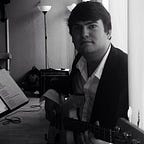Sir Peter Maxwell Davies’ 10th Symphony World Première
London Symphony Orchestra, Barbican Hall
Conducted by Sir Antonio Pappano, director of the Royal Opera House at Covent Garden, tonight’s programme takes the mighty London Symphony Orchestra on a tour of the best of British compositional talent, past and present, with Britten’s sublime Violin Concerto, a concert overture from Elgar, ‘In The South’, and the pièce de resistance, the première of Sir Peter Maxwell Davies’ Tenth Symphony. Broadcast live on BBC Radio Three and simultaneously recorded for the LSO’s own label, LSO Live!, this concert is an early highlight of the 2014 season.
As the sold-out Barbican Centre filled up, so did the growing sense of anticipation. With what looked like the whole of the London musical establishment in attendance, Maxwell Davies’ symphony has much to live up to: having been diagnosed with terminal leukemia merely months earlier (and now in his 80th year), however thankfully the celebrated composer is still on top form.
Tonight’s programme is extra special for having the supremely talented Russian violinist, Maxim Vengerov, as soloist in the Britten Concerto. Over from his Monaco home, he requested a change to the published programme in order to play the challenging, emotive Britten work. Written barely a year after Picasso unveiled Guernika to the world at the Paris World Fair, it contains much of the same anguish and melancholy within its three movements. Vengerov approached the challenging concerto with gusto, with beautifully smooth tone for the soft, solo legato sections and an edgy attack to the discordant, rapid, tension-building passages. His violin soared over the orchestra during the tutti passages, and he had the whole auditorium captivated during the second movement solo.
Described by the composer himself as “the wildest music I’ve ever written”, it speaks of creativity, life and death, and acts as an homage to one of the most important sources of inspiration in Maxwell Davies’ life, the 17th century Italian architect, Francesco Boromini. Featuring an expanded percussion section, including a xylophone and marimba as well as the mighty LSO Chorus (led by Simon Halsall), the resultant symphony is bleak and intense, with German baritone Markus Butter singing Boromini’s anguished suicide note. The tricky score combined undertones of Sibelius with some of Maxwell Davies’ more traditional fingerprints, such as the wild brass fanfares alongside delicately scored strings and woodwinds.
The Telegraph’s reviewer, Ivan Hewett, commented that ‘It felt as if Maxwell Davies was simultaneously bowing his head to mortality, and shaking his fist at it.’ As a young music student studying composition, I had the opportunity to meet the composer himself a number of years ago, opening a newly built Music School, and I remember him being endlessly patient, listening to my work and critiquing it here and there, suggesting improvements. As he steps down from his post as Master of the Queen’s Music this year and undergoes another course of chemotherapy, I do hope he continues to output new works at the same furious rate for our appreciation.
